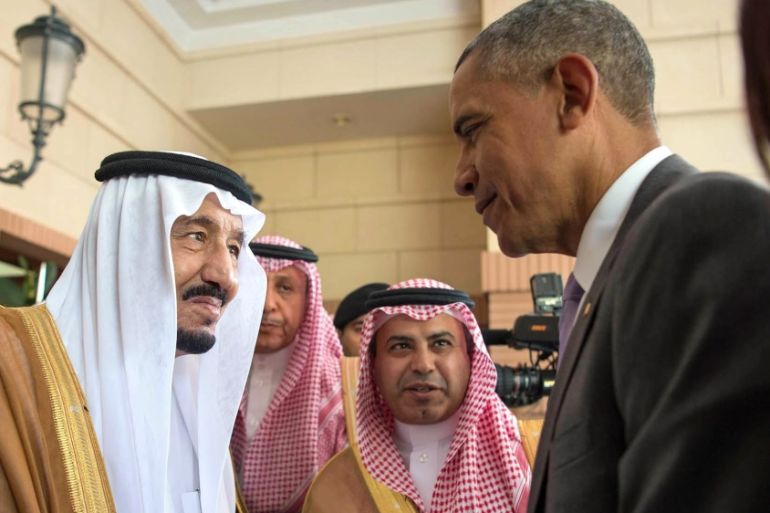What to expect from Obama’s GCC summit?
A second round of the US-GCC summit is taking place amid shifting political and economic scenes.

The second US-GCC summit comes at a time when the views of the United States and the Gulf Cooperation Council on regional politics are drastically different. Recent and open expressions of frustration by US President Barack Obama revealed some of the contentious differences on key issues.
On Wednesday, Obama met Saudi Arabia’s King Salman to seek joint action on security threats including Iran and the Islamic State of Iraq and the Levant (ISIL, also known as ISIS) group. On Thursday, Obama is expected to attend a GCC summit that comprises Saudi Arabia, Kuwait, Qatar, Bahrain, the United Arab Emirates and Oman.
Keep reading
list of 4 itemsQatar emir condemns ‘genocide’ in Gaza, urges ceasefire at GCC summit
‘Enduring commitment’: Key takeaways from US-GCC joint statement
Analysis: Efforts to end Assad isolation gather speed after quake
According to the GCC spokesperson, the main issue on the summit’s agenda will be the Iranian interventions in regional politics. The US, on the other hand, is more concerned with the persistent GCC-Iran rivalry and the burden it places on the US to “settle scores” once it gets out of capacity and out of hand.
Also high on the agenda, according to a White House official, is the fight against ISIL and other defence issues.
READ MORE: Obama, will it be Iran or the GCC?
|
The US’s call for coexistence, after violence and aggression has taken precedence, can prove elusive. This is easily demonstrated after the bitter and costly confrontations in the region. |
Last May, Obama hosted the six-nation Gulf Cooperation Council for a rare summit at the Camp David presidential retreat. He pledged then that the US would cooperate with them to address what he called Iran’s “destabilizing activities in the region”.
The US’s call for coexistence, after violence and aggression has taken precedence, can prove elusive.
This is easily demonstrated after the bitter and costly confrontations in the region.
The open, multilateral war in Syria enters its fifth year with massive humanitarian, political and economic ramifications. The latest Syrian Geneva peace negotiations is back at square one with the presented document of “Basic elements for a political solution”; described as “bland” and “off the point” by key observers.
The situation across the region is hardly different. A revolution is fermenting in Egypt. Lebanon recently lost a promised $4bn Saudi military aid for not backing GCC side against Iran. Officials in Lebanon did not endorse an Arab League public condemnation of Hezbollah, an Iranian-backed Lebanese armed militia.
In Yemen, a Saudi-led GCC coalition war has entered its second year without a foreseeable resolution. Houthi rebels refused to attend a recent UN-backed negotiation in Kuwait for failure of “the other party to commit to a ceasefire”.
The Yemeni negotiations are also obstructed by the Houthis’ demand to replace Abd-Rabbu Mansour Hadi as a president and by Yemen’s southern secessionist movement demand for immediate secession. The situation in Yemen is rapidly approaching the Syrian multilateral war scene.
The domestic economic scene is another aspect that should not be neglected. While economic leverage was presumed to be the cushion that prevented social unrest in the GCC region, economic cuts as a result of the low oil prices are beginning to impact societies.
|
|
A recent manifestation took place in Kuwait where oil workers began a strike on Sunday over public sector pay reforms. There are growing fears that the strike might extend to neighboring GCC countries, particularly in light of recent economic measures.
Last week, top oil producers failed to reach consensus on a freeze of oil production; reflecting the growing tension between Saudi Arabia and Iran. The latter aims to increase production to compensate for its long years under sanctions.
Also in anticipation of Obama’s second visit, a group of human rights advocated have written an open letter to urge the president to pressure GCC leaders for political and civil reforms. However, such efforts are expected to be fruitless.
Last year, the US-GCC summit received similar appeals. Understandably, it is hard to conceptualise the link between more freedom and civil rights in GCC and regional stability, as there are many variables involved in fostering and enabling regional violence.
However, the most important ingredient remains to be an open political environment that enables people to freely express concerns, challenge violent ideologies and participate freely in political decision-making.
It is, therefore, expected that any strategies aimed at achieving regional stability and economic reforms will need to apply measures of meaningful political reforms, not only to drive regional stability but also to reduce the effect of violent ideology fuelling the regional conflicts.
It is not a question of luxury but of necessity to press for a space for a counter-discourse of moderation and modernisation, where the price of freedom of expression, and that of regional stability, is not paid in life or liberty.
The writer is a Visiting Scholar at the Arab Gulf States Institute in Washington DC